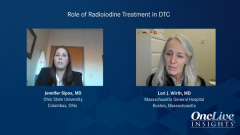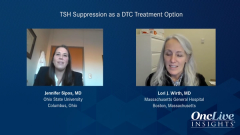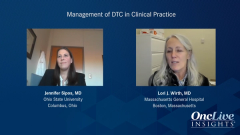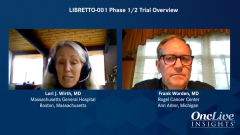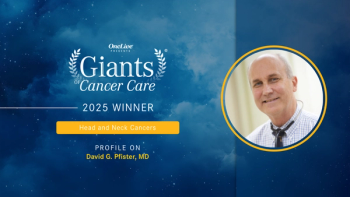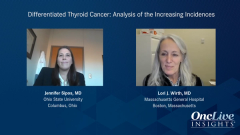
Roles and Communication in Treatment in DTC
Episodes in this series

Lori J. Wirth, MD: Say the genomic testing doesn’t show an actionable alteration, and a patient needs therapy because they have progressive disease. Do you get involved at all in the discussions of which TKI [tyrosine kinase inhibitor] to use? We do have 2 approved TKIs. Sorafenib was the first TKI approved based on a PFS [progression-free survival] benefit and the DECISION trial, compared with placebo. That was followed by the SELECT trial with lenvatinib, where a PFS benefit was compared with placebo.
The response rates were different. It was 12% with sorafenib and 65% with lenvatinib. The list of adverse events and toxicities are pretty similar with the drugs. They’re fairly similar in dose reduction and dose discontinuation rates due to toxicity. Do you talk about that with the patients and your medical oncology colleagues? Is there 1 standard approach that you have at Ohio State University in your group?
Jennifer Sipos, MD: Yes. In general terms, the oncologist makes the decision of what’s going to happen with the patient once there is the need for a systemic therapy. They consider whether we have an active trial that the patient would qualify for and wants to participate in. Then we assess whether they have comorbid diseases or what their thyroid cancer is doing that would put them at risk with 1 treatment vs another. We always have to consider where the metastatic deposits are and if the patient is at risk for a bleeding complication or something, based on their individual disease or their comorbid conditions.
We have that conversation in a group in our multidisciplinary clinic or multidisciplinary tumor board. The person who is ultimately making that decision is going to be 1 of our oncologists. But we talk about it as a group among one another, and the oncology team makes that decision.
I try 1 other thing. I try really to have a conversation with the patients when setting the stage to try to make sure patients understand what a clinical trial really looks like. I’m sure you probably hear a lot too, “I don’t want to be guinea pig.”
Lori J. Wirth, MD: Yes.
Jennifer Sipos, MD: I try to make sure patients understand that this is the cutting-edge science, and there’s a reason to believe that these drugs that we’re trying now work. We have the FDA-approved agents as our backup if we need them, but if we have a clinical trial and someone is a good candidate for it, that’s ideal. They get their medication for free, which is pretty good.
Lori J. Wirth, MD: That matters. The co-pays can be difficult with the different therapies. That’s how we do it at Massachusetts General Hospital. Ultimately, the medical oncology people are making the recommendations regarding which agent is the best first agent. My perception of the data is that the patients who were enrolled in the SELECT trial with lenvatinib and got placebo had a very short progression-free survival. They were fairly sick patients with fairly aggressive disease and a median progression-free survival of only 4-plus months. The PFS benefit was significant, so the progression-free survival in that study was more than 18 months. Those data are a bit stronger than the PFS benefit seen with the DECISION trial and sorafenib. In patients who had a placebo, there was a slightly longer progression-free survival. There’s a better drug between those 2, and it’s lenvatinib.
One thing we do see is that there is a drop-off in patients who go on to receive second-line therapy. Only about 50% of patients with iodine-refractory DTC [differentiated thyroid cancer] will have second-line therapy. If that’s the case, I don’t want to save lenvatinib as a better drug for the second line, because a lot of patients might never get it.
Jennifer Sipos, MD: Yes.
Lori J. Wirth, MD: We don’t want to miss out on using a better drug in that regard.
Jennifer Sipos, MD: We definitely use more lenvatinib than sorafenib as well. That’s out there as an option, and it has much more use here for that reason.
Transcript edited for clarity.



